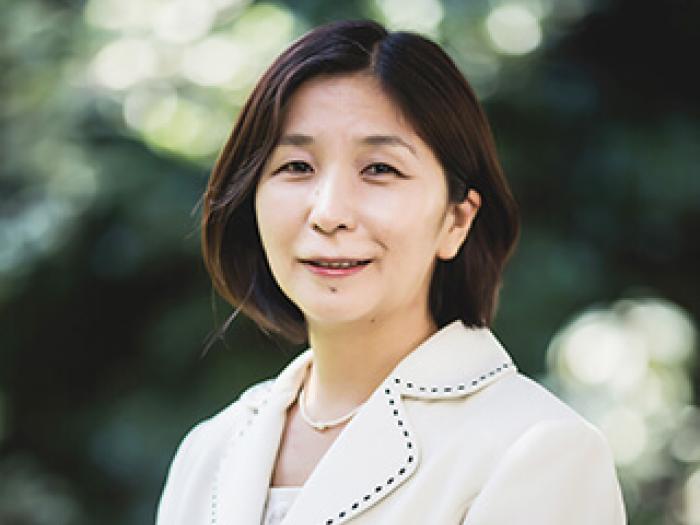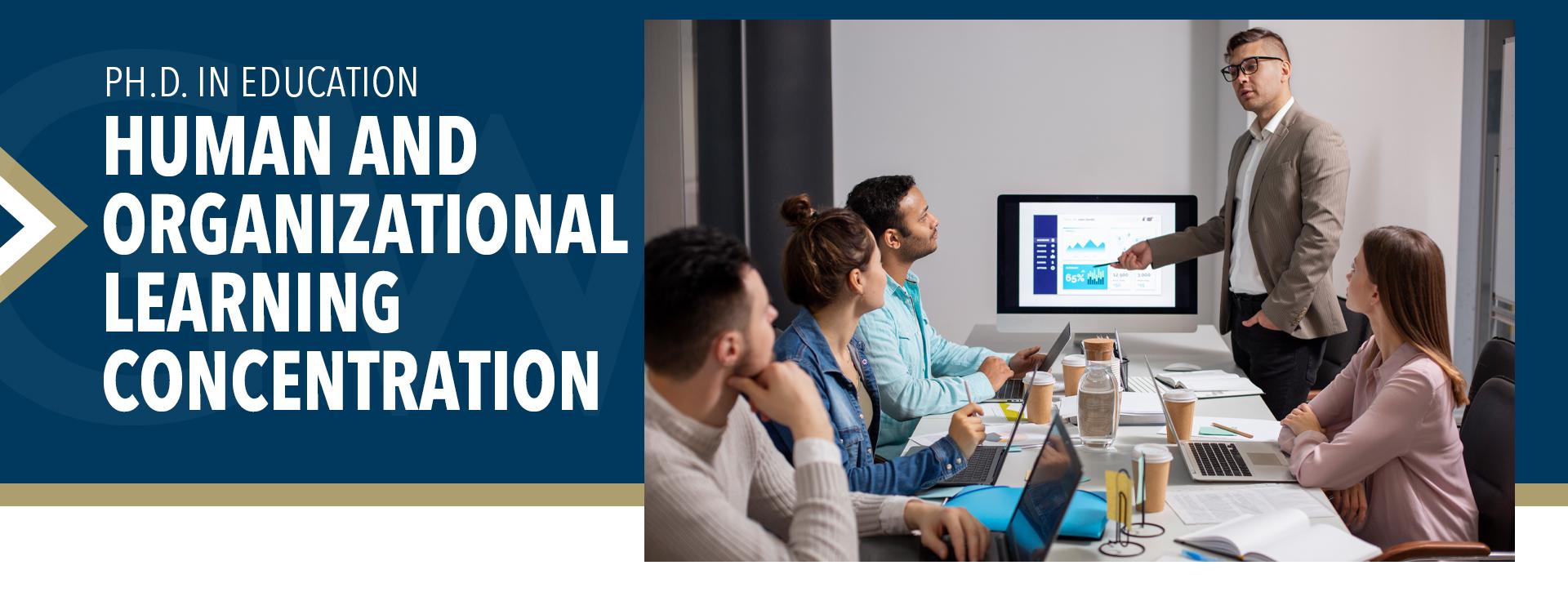Ph.D. in Education - Human and Organizational Learning Concentration
Explore the Science Behind Learning
The Human and Organizational Learning concentration takes a cross-disciplinary approach to engaging in research and scholarship to study and apply leadership, learning, culture, and change at individual, organizational, and societal levels.
The program of study enables PhD students to conduct research on complex organizational topics and develop theories and models to guide global, equitable, and sustainable organizational practices. These objectives will be met by fostering an environment of cross-disciplinary collaboration, critical thinking, and a global mindset.
Cross-Disciplinary Perspectives
Our diverse student body represents educational or professional backgrounds in psychology, sociology, business, the humanities, education, or the sciences.
Hands-On Experiential Learning
Take part in our larger inclusive cross-disciplinary team as well as a more focused research project. You’ll bring your experience in education to the design, development, data collection, and analyses of a research project.
Principles of Research
Gain a deeper understanding of the responsible conduct of research with human subjects, research ethics, and how to consider the social impact of the work.
The GW Advantage
As a Carnegie R1 institution (very high research activity), the George Washington University is home to world-class faculty that are leading cutting-edge research, along with diverse labs, cross-collaborative initiatives between schools and local organizations, and unparalleled educational and employment opportunities.
Our connections to influential and multi-sector organizations and institutions provide access to information, research sites, and collegial networks of likeminded professionals.
Degree:
Doctor of Philosophy (PhD) in Education, Human and Organizational Learning Concentration
Course Delivery:
Foggy Bottom Campus
Program Entry:
Fall
- Curriculum Requirements
The following requirements must be fulfilled: 60 credits, including 36 credits in core courses, and 24 credits in the concentration, successful completion of a research project, successful completion of the comprehensive examination; oral defense of both the dissertation proposal and the dissertation.
Required Core Courses: SEHD 8200 Foundations of Education I SEHD 8201 Foundations of Education II SEHD 8210 Doctor of Philosophy Seminar in Education Research I SEHD 8211 Doctor of Philosophy Seminar in Education Research II Research Methods: 12 credits of doctoral-level research methods coursework, selected in consultation with advisor. At least one course must be in quantitative research methods and one in qualitative research methods. Dissertation: SEHD 8999 Dissertation Research (taken for at least 12 credits) Additional Requirements: Successful completion of a research project. Successful completion of the comprehensive examination. Oral defense of both the dissertation proposal and the dissertation. Human and Organizational Learning Concentration Requirements: 15 credits of doctoral-level Human Organizational Learning (HOL) courses and 9 credits of additional concentration credits. Course selections are determined by the focus of the concentration and the specific interests of the student. - Example Research Questions
Students will be dedicated to understanding the changing nature of working in an environment of rapid sociocultural and technological changes. Examples of research questions addressed by this team will include:
- How do institutional environments, informal learning ecosystems, and emerging lifelong learning patterns foster innovation in global and indigenous workforce development models and framework?
- What are the emerging learning, leadership, and change strategies in an environment driven by rapid socio-cultural and technological changes such as artificial intelligence, data analytics, virtual work, and networked organizations to foster sustainable economic and organizational models?
- How can neuroscience and emerging findings from evolutionary biology contribute to our understanding of learning and development in organizations?
- How can emerging evidence from quantum theory inform new leadership, organizational, and institutional models and frameworks?
- What are the implications of the changing nature of work on effective organizational structures and change processes, and on social equity and inclusion?
Apply Now
The PhD in Education: Human and Organizational Learning concentration is not currently accepting applications.
For more information or to inquire about similar programs, such as the EdD in Human and Organizational Learning, contact the GSEHD Admissions Team at docinfo![]() gwu [dot] edu (docinfo[at]gwu[dot]edu) or 202-994-9283.
gwu [dot] edu (docinfo[at]gwu[dot]edu) or 202-994-9283.
To be considered for admission, applicants must submit the online application form as well as the following required supporting documents. There is no application fee.
- Prerequisite: Master’s degree in psychology, sociology, business, education, the sciences, or related fields
- Curriculum Vitae
- Statement of Purpose: An essay of 1200 words or less, through which the applicant clearly identifies the purpose in undertaking cross-disciplinary graduate study in human and organizational learning (HOL) that includes: (a) rationale for seeking a Ph.D.; (b) articulation of research interests aligned with the research questions described above; and (c) how the applicant’s background and related qualifications prepared them for this work and a research intensive career.
- 3 Letters of Recommendation, with one preferred from a professor in the applicant’s Master’s degree program
- Transcripts from all previously attended colleges or universities
- Interview with Faculty: Applicants should be prepared to discuss the alignment of their research interests with those of the research questions provided above. Additional materials may be required of applicants as a result of the interview.
- Writing Sample: Applicants are required to submit a current writing sample. The sample should reflect the applicant’s abilities to articulate complex ideas and to utilize evidence in support of the arguments provided. The writing sample should also provide evidence of the applicant’s research skills and engagement with scholarship.
Please note: The GRE is not required.
*Additional application requirements may exist for international applicants.
Tuition & Financial Aid
We know embarking upon graduate school is a big decision - due in part to the costs of attending. At GW, we understand the time and thought behind making graduate school work for you. Please take a moment to learn more about the options and opportunities available to help fund your graduate education.
Graduate tuition is charged per credit hour, unless otherwise noted. Rates vary by program and location.
The tuition rate for the PhD in Education - Human and Organizational Learning Concentration program is $1,960 per credit hour.
This program requires 60 credits.
Please note: Additional fees may apply for international students, late fees, etc. Current tuition rates may be updated during the year.
*Summer 2025, Fall 2025 and Spring 2026
Scholarships are available to eligible admitted students. Review eligibility requirements and learn more about funding your education >
Career Outlook
A Ph.D. in Education with a concentration in Human and Organizational Learning can lead to a variety of research-intensive careers in education, consulting, and policy research. Additionally, students may find opportunities for interdisciplinary work, combining expertise in education and human and organizational learning with other fields such as psychology, sociology, business, or technology.
- Human and Organizational Learning Career Opportunities
-
Some potential career paths include:
University Professor or Researcher: Work in academia, teaching courses in education, human development, organizational behavior, or related fields. You might also conduct research on topics such as learning theories, adult education, organizational change, or leadership development.
Policy Analyst or Advocate: Analyze workforce education policy, advocate for educational reform, or influence workforce education policy at your local, state, or national levels by working in a government agency, non-profit organization, think tank, or advocacy group.
Researcher or Evaluator: Conduct research on workforce pathways, workplace educational practices, program evaluation, or organizational learning initiatives for research institutes, think tanks, or consulting firms.


Department Chair and Professor, Human and Organizational Learning

Associate Professor, Human and Organizational Learning






